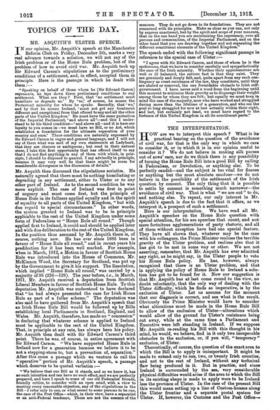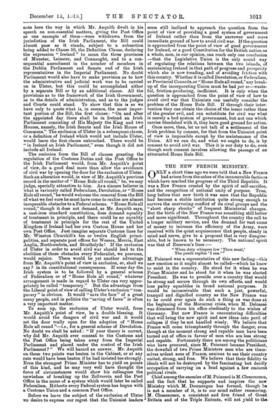THE INTERPRETATION.
ri0 IV are we to interpret this speech ? What is its practical bearing on the question of the avoidance• of civil war, for that is the only way in which we care to consider it, or in which it is in our opinion useful to consider it ? We do not believe in making silk purses out of sows' ears, nor do we think there is any possibility of turning the Home Rule Bill into a good Bill by calling it Federalism, or Devolution, or anything else. To be perfectly candid—and the subject is too vital for finesse or anything but the most absolute candour—we do not believe in the possibility of the settlement of the Irish question by consent. The only thing that it is possible to settle by consent is something much narrower—the avoidance of civil war. That is what "we are out" to do, and nothing else. To repeat, our only interest in Mr. Asquith's speech is due to the fact that it offers, as we interpret it, a prospect of such a settlement. Here is our interpretation. We have read all Mr.
Asquith's speeches on the Home Rule question with special attention, for his are speeches that count, and not mere fortuitous agglomerations of party rhetoric, and all of them without exception have had one special feature. They have all shown that, whatever may be the case with his colleagues, the Prime Minister realizes the terrible gravity of the Ulster problem, and realizes also that it has got to be met in some way or other. We are not asserting, remember, that Mr. Asquith has ever admitted any right, as he might say, in the Ulster people to veto his Home Rule policy. He has, however, always recognized that there is an Ulster problem, and that in applying the policy of Home Rule to Ireland a solu- tion has got to be found for it. Now our suggestion is that Mr. Asquith has at last come round to the view, no doubt reluctantly, that the only way of dealing with the Ulster difficulty, which he finds so imperative, is by the exclusion of Ulster. Let us assume for the moment that our diagnosis is correct, and see what is the result. Obviously the Prime Minister would have to consider what alterations must be made in the Home Rule Bill to allow of the exclusion of Ulster—alterations which would allow of the ground for Ulster's resistance being' cut away, while at the same time a Parliament and Executive were left standing in Ireland. If we suppose' Mr. Asquith re-reading his Bill with this thought in his mind, he would, we believe, find in it only two insuperable obstacles to the exclusion, or, if you will, " temporary " exclusion, of Ulster.
Theoretically, of course, the question of the exact area to which the Bill is to apply is unimportant. It might be made to extend only to one, two, or twenty Irish counties, and not to the rest of Ireland, without any technical flaw being produced in it. But in practice, and since Ireland is surrounded by the sea, very considerable physical difficulties would arise if the area to which the Bill in its existing shape is made to apply were to be Ireland less the province of Ulster. In the case of the present Bill this would mean setting up a line of Custom-houses along the Ulster frontier and a separate postal system for Ulster. If, however, the Customs and the Post Office—. note here the way in which Mr. Asquith dwelt in his speech on non-essential matters, giving the Post Office as one example of them—were withdrawn from the jurisdiction of the Irish Parliament, the Bill could almost pass as it stands, subject to a subsection being added to Clause 50, the Definition Clause, declaring the expression " Ireland " to mean the three provinces of Munster, Leinster, and Connaught, and to a con- sequential amendment in the number of members in the Dublin Parliament and Senate and of the Irish representatives in the Imperial Parliament. No doubt Parliament would also have to make provision as to how the administrative and judicial work was to be carried on in Ulster, but this could be accomplished either by a separate Bill or by an additional clause. All the provisions as to the framework of the Irish Government, as to the details of administration, and as to the judges and Courts could stand. To show that this is so we have only to quote what is, in essence, the most impor- tant portion of the Bill, the first clause : " On and after the appointed day there shall be in Ireland an Irish Parliament consisting of His Majesty the King and two Houses, namely, the Irish Senate and the Irish House of Commons." The exclusion of Ulster in a subsequent clause, or a definition of Ireland which would not include Ulster, would leave the first clause untouched. There would be " in Ireland an Irish Parliament," even though it did not include all Ireland.
The omission from the Bill of clauses granting the regulation of the Customs Duties and the Post Office to the Irish Parliament would, from Mr. Asquith's point of view, do a good deal more than allow the avoidance of civil war by opening the door for the exclusion of Ulster. Such an alteration would, in view of Mr. Asquith's previous record in the matter• of " Home Rule all round," be, we may judge, specially attractive to him. As a sincere believer in what is variously called Federalism, Devolution, or " Home Rule all round," he would welcome the removal from the Bill of what we feel sure he must have come to realize are almost insuperable obstacles to a Federal scheme. " Home Rule all round," though it does not demand, as Mr. Asquith says, a cast-iron standard constitution, does demand equality of treatment in principle, and there could be no equality of treatment in principle for the rest of the United Kingdom if Ireland had her own Custom House and her own Post Office. Just imagine separate Customs lines for Mr. Winston Churchill's ten or twelve English princi- palities, and separate post offices for Wessex, Mercia, East Anglia, Northumbria, and Strathclyde ! If the exclusion of Ulster in order to avoid civil war should lead to the abolition of these obstacles every Federalist, we presume, would rejoice. There would be yet another advantage from Mr. Asquith's point of view in exclusion, or, shall we say ? in its constitutional consequences. If some day the Irish system is to be followed by a general scheme of Federalism or of "Home Rule all round," whatever arrangement is made in regard to Ulster can very appro- priately be called " temporary." But the advantage from the Liberal point of view of calling Ulster's exclusion" tem- porary " is obvious. It would " save the face " of a great many people, and in politics the "saving of faces" is often a very important matter.
To sum up, the exclusion of Ulster would, from Mr. Asquith's point of view, be a double blessing. It would avoid the dangers of civil war and it would set the door really open for the adoption of " Home Rule all round "—i.e., for a general scheme of Devolution. No doubt we shall be asked : " If your theory is correct, why did Mr. Asquith ever consent to the Customs and the Post Office being taken away from the Imperial Parliament and placed under the control of the Irish Parliament ? " We will hazard an answer. Mr. Asquith on these two points was beaten in the Cabinet, or at any rate would have been beaten if he had insisted too strongly. Even the strongest Prime Minister has to yield on points of this kind, and he may very well have thought the force of circumstances would show his colleagues the unwisdom of breaking up the Zollverein and the Post Office in the name of a system which would later be called Federalism. Hitherto every Federal system has begun with a Customs Union and a common Post Office.
Before we leave the subject of the exclusion of Ulster we desire to express our regret that the Unionist leaders seem still inclined to approach the question from the point of view of providing a good system of government of Ireland rather than from the narrower and more immediate ground of how to avoid civil war. If the question is approached from the point of view of good government for Ireland, or a good Constitution for the British nation as a whole, men, in our opinion, can reach only one conclusion —that the Legislative Union is the only sound way of regulating the relations between the two islands, of maintaining Ireland in that path of progress and prosperity which she is now treading, and of avoiding friction with this country. Whether it is called Devolution, or Federalism, or Provincial Councils, or "Home Rule all round," any break- up of the incorporating Union must be bad per se—waste- ful, friction-producing, inefficient. It is only when the question is approached from the point of view of how to avoid civil war that Unionists can usefully consider the problem of the Home Rule Bill. If through their inter- vention they can obtain the choice of the lesser rather than of the greater evil, and can substitute for civil war what is merely a bad system of government, but not one which carries bloodshed with it, they have good ground for action.
Once more, then, let us not talk of a settlement of the Irish problem by consent, for that from the Unionist point of view is impossible except by the maintenance of the Union. All we can do, and what we ought to do, is by consent to avoid civil war. This it is our duty to do, even though such consent involves allowing the passage of an attenuated Home Rule Bill.



























































 Previous page
Previous page